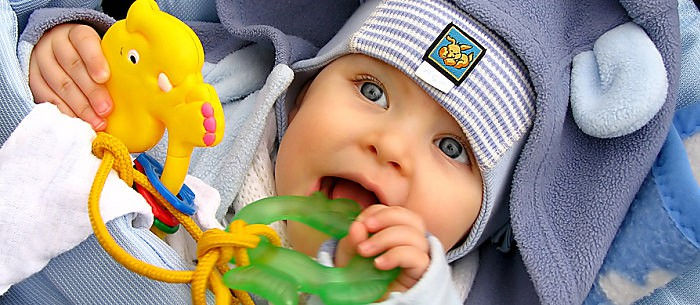Many parents look forward to their child’s first toothy grin, but teething can also be a source of stress — and a plethora of questions. There’s a lot of misinformation out there, both in terms of symptoms and remedies. Even the experts can’t agree on everything.
According to Dr. Maria Hernandez-Reif, a child development professor and the director of the Pediatric Development Research Lab at the University of Alabama, “Research in infant teething suggests that more research needs to be done.” In short, while there are a lot of unknowns about the eruption of first teeth, you can still help your baby feel more comfortable.
Here are eight little-known facts research has shown and that every new parent should know:
- Common “Symptoms” May Be Caused By Illness
Many people (including health professionals) attribute symptoms, such as a low-grade fever, diarrhea and a runny nose, to cutting teeth. However, one “Pediatrics” journal study shows no direct causation. Experts don’t all agree about whether teething causes fevers. According to Dr. Jill Lasky, a pediatric dentist, these symptoms are actually caused by illnesses. “When a child teethes, little tears occur in the gum as the tooth erupts. These tears are gateways for bacteria and viruses to enter your child’s body and make her ill,” she says.For more on symptoms, read Teething Symptoms in Babies.
- Excessive Drooling Isn’t Normal
Parents also believe that cutting teeth causes drooling — and a lot of it. However, according to Diane Bahr, a speech-language pathologist and the author of “Nobody Ever Told Me (or My Mother) That!,” “Mild drooling is usually a part of the teething process, but excessive drooling is never normal.” Don’t write off excessive drooling — get it checked out by your pediatrician, as it could indicate something more serious.
- First Teeth Can Erupt Between 3 to 14 Months
Parents usually expect their baby’s first tooth to come in when baby’s between 4 and 6 months old. However, according to Dr. Lasky, there’s a much wider range for first teeth. An early teether may get his first tooth as early as 3 months old, while a late bloomer may not see his first white cap until 14 months. “It doesn’t have anything to do with baby’s health or development — it all comes down to family history,” says Lasky.
- Babies Need to Bite and Chew to Cut Teeth
All that mouthing and biting your little one does prior to cutting a tooth serves a purpose. According to Bahr, “Appropriate mouthing experiences allow teeth to emerge on time, in a proper sequence and fully formed.” Through clinical experience, Bahr has seen that chewing seems to be crucial for tooth eruption, so let your little one chew until her heart’s content.
- Some Toys Are Better Than Others
On a similar note, Bahr says that a lot of the toys on the market today aren’t actually the best for your baby’s teeth. “Babies need to chew on all surfaces of the mouth — not just the front — and a lot of toys are just too big,” says Bahr. Instead, look for toys large enough so your baby won’t swallow or choke on them, but small enough so she can move the toy safely around her mouth.
- Breast Milk May Help Pain
Mothers are often concerned about how the eruption of baby teeth will affect their nursing relationship. According to Dr. Hernandez-Reif, breastfeeding provides one of the best methods of pain relief out there. “Breast milk has been shown to have analgesic, relaxing and immune properties. It’s also very soothing for infants to nurse,” she says. Additionally, babies can’t bite when latched on properly.
- Don’t Use Teething Gels
Contrary to popular belief, don’t use teething gels to help soothe your little one’s sore gums. “Topical numbing gels are not recommended for infants and young children,” says Dr. Lasky. In fact, the U.S. Food and Drug Administration warns against using benzocaine for children under 2 years of age as it can lead to a rare but serious condition called methemoglobinemia, a blood disorder in which the hemoglobin cannot effectively release oxygen in the body.
- Watch Out For Pointy Teeth
Dr. Lasky also warns parents that their baby’s new, emerging teeth are sharper than they may think. “Avoid using rings with liquid or gel inside. An erupting tooth can pierce the plastic and your child can ingest unknown, perhaps harmful, chemicals within,” she says. Likewise, parents should avoid using frozen foods for pain relief. Your baby’s sharp teeth could cut off a chunk of food, causing her to choke. Instead, wet a clean washcloth, place it in the freezer until cold and give it to your baby to chew.
Rebecca Desfosse is a freelance writer specializing in parenting and family topics.
* This article is for general informational purposes only. It is not intended nor implied to be providing medical advice and is not a substitute for such advice. The reader should always consult a health care provider concerning any medical condition or treatment plan. Neither Care.com nor the author assumes any responsibility or liability with respect to use of any information contained herein.






